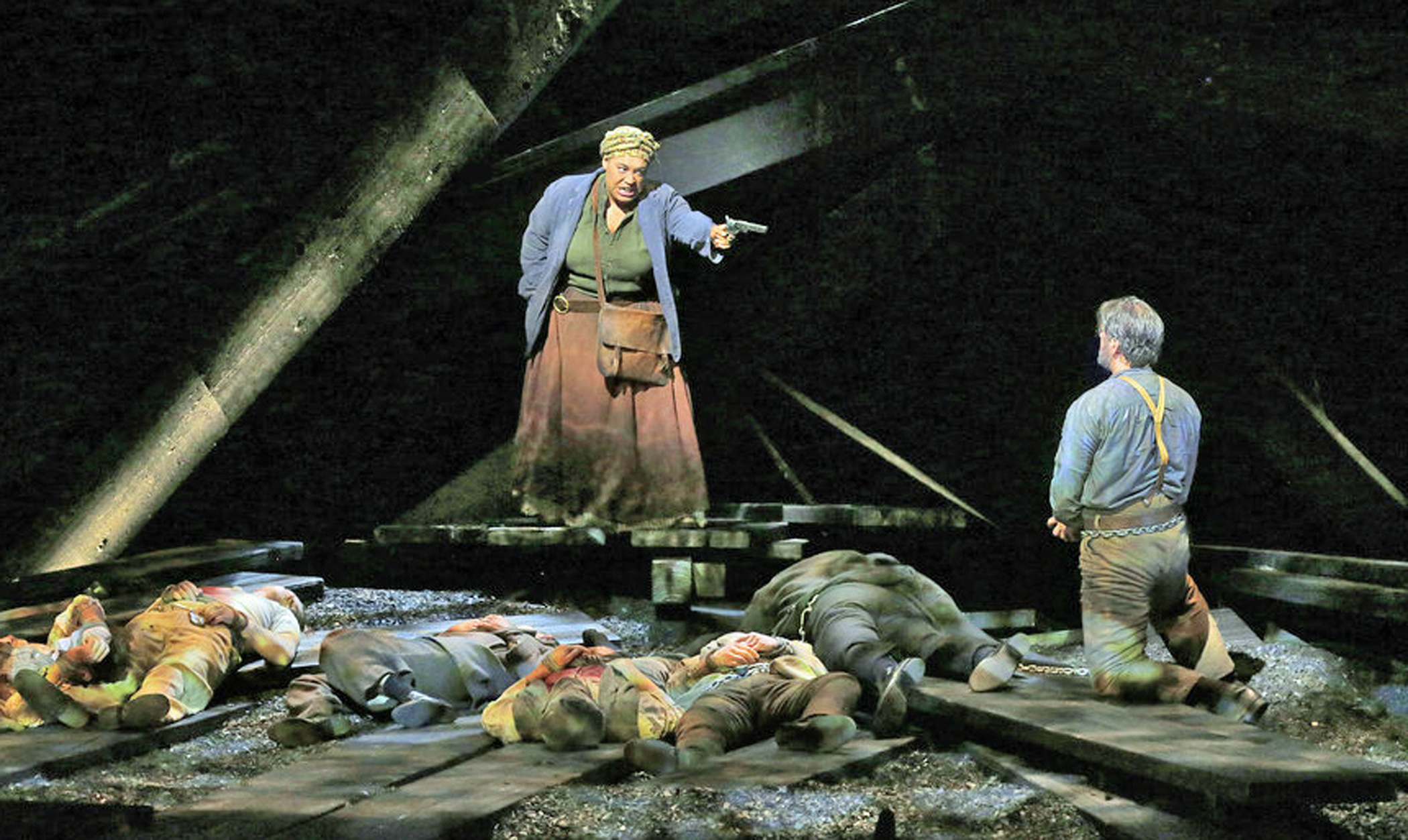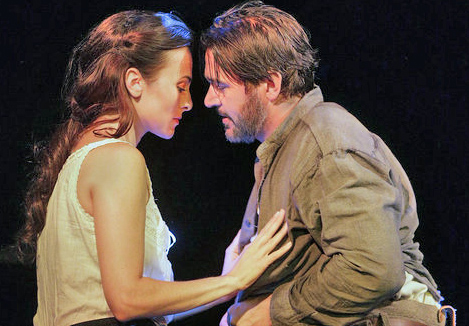
Cold Mountain. Opera by Jennifer Higdon. Libretto by Gene Scheer. Santa Fe Opera, 2015 world premiere.
This first opera by the renowned composer Jennifer Higdon is based on a 1997 novel by Charles Frazier about the Civil War soldier W.P. Inman who deserts from the Confederate Army to travel home to his North Carolina mountain.
Higdon has the background to depict that milieu; she grew up in the Blue Ridge mountains of Tennessee and her orchestral compositions have displayed colorful sonorities. But this score is too cautious in letting those elements unfurl. Higdon does not expand on the rich music vocabulary she used in her instrumental compositions Soliloquy, All Things Majestic and Concerto for Orchestra.
The novel was made as a movie in 2003 with Jude Law, Nicole Kidman, and Renée Zellweger. Book and film were hailed as poignant epics about the horror of war. On the other hand, many sad tales about Vietnam, Iraq and Afghanistan have intervened. We’ve all heard harrowing stories of the aftermaths of those conflicts.
Thus this narrative has less emotional impact than it did in 1997 and 2003. Some observers will feel moved by the misery while others will shrug and say “been there.”
What remains interesting is Inman’s 300-mile journey and his trials along the way. This is reminiscent of Homer’s Odyssey, but don’t expect the excitement of Ulysses’ adventures with Calypso, Circe, Cyclops and the Lotus-Eaters. It’s best if you attend Cold Mountain with modest expectations.
The compositional style of the 50-year-old Higdon is traditionally tonal rather than discordantly modern. This might lead the listener to expect music along the lines of Samuel Barber or Aaron Copland. Considering the subject matter, perhaps something like Barber’s Knoxville Summer of 1915 or Copland’s Appalachian Spring.
Ah, if it were only so! Or if this opera had the color of Higdon’s blue cathedral in which she used tiny tinkling chimes to evoke heaven. This score uses those chimes, briefly and not prominently enough.
There are many moments in Cold Mountain where the orchestral writing is merely a comment on the words already spoken. For example, a character remarks about rain and the orchestra follows with the sounds of falling raindrops. Another person sings about birds and we hear flutes. And another character sings about snow and the orchestra follows with soft feathery music. Contrast that with the start of Act III in Puccini’s La Boheme where the orchestra creates a chill and makes the audience shiver before any singer utters a word. Or the opening of Verdi’s Otello where the orchestra portrays a storm before anyone opens his or her mouth.
So what we have in Cold Mountain is an expertly crafted dramatization of an Odyssey tale, with music that is enjoyable without being memorable. The New York Times called it indecisive and turgid. That’s going too far.
The opera contains a gripping confrontation with a black escaped slave named Lucinda (the wonderful Deborah Nansteel) who hates all white men and pulls a gun with intent to kill Inman. And we are moved by an episode where Inman comes upon a young war widow, Sara (the appealing Chelsea Basler) who asks him to lie with her and promise not do anything more.
Nathan Gunn is a poignant Inman, sympathetic in acting and singing. It’s frustrating that the score doesn’t give him a stirring aria that might stand alone in a concert or on a recording. He is not so much a protagonist as a man to whom things happen, and he could use a signature piece.
Just before the war Inman met a preacher’s daughter, Ada Monroe (the lovely mezzo Isabel Leonard). She is an interesting person, a literate country gal who loves to use similes, and she is given a brief aria of her own. Inman feels she is the love of his life and wants to return and marry her.
Back in North Carolina, Ada’s father has died and she is befriended by a mysterious mountain girl, Ruby (the strong Emily Fons), who becomes her partner in running a farm. The bonding of the two disparate women is touching. Inman returns after a four-year absence and he and Ada sing a love duet which is sweet but doesn’t reach the soaring heights you’d expect after such a long separation.
The musical climax, rather, is the overlapping appearance of characters from past scenes returning. Lucinda instructs him, “Tell her of the slave you met”, another character sings “Tell her what I said”, and so on.
Here and throughout the opera, the best moments are of multiple-voice ensembles such as hymn-like choruses where mixed voices sing of leaving home and family in Act I, and of soldiers who are buried and forgotten in Act II.
A large cast included Kevin Burdette as Ruby’s dissolute father, Stobrod; Anthony Michaels-Moore as Ada’s father, Monroe, and also Pangle, the simple-minded companion of Stobrod. The dramatic tenor Jay Hunter Morris was a vivid Teague, a villainous leader of a Confederate military unit searching for deserters or people hiding them.
Director Leonard Foglia placed the action of Act I across a wide abstract set by Robert Drill with massive planks criss-crossing one another, suggesting the intersecting pieces of the sprawling story. It looks cluttered, and I was glad to see that Act II was played on more comfortable ground.
Projections by Elaine McCarthy gave us illuminating stars in the sky and a blizzard of snow. The carefully-timed lighting by Brian Nason enabled an effective cross-cutting between episodes.
A 2 CD album of this production is available from Pentatone Records (http://www.pentatonemusic.com/)
Below, Isabel Leonard and Nathan Gunn.

Please share your thoughts and your opinions at editor@theculturalcritic.com
Read other reviews on The Cultural Critic